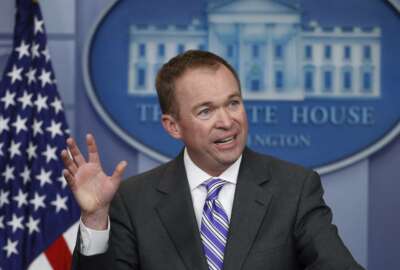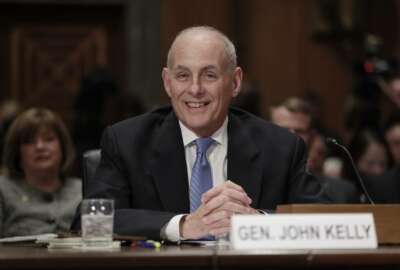
Concerned by TSA, Coast Guard budget cuts, senators push DHS nominee for answers
Amid reports that the White House is planning budget cuts at the Coast Guard, Transportation Security Administration and Federal Emergency Management Agency to pay...
Many Democrats on the Senate Homeland Security and Governmental Affairs Committee are skeptical the Homeland Security Department will use the results from cost benefit analyses and other pilot studies to inform operational and budgetary decisions about the department’s new immigration and border security policies.
They used a nomination hearing for Elaine Duke, President Donald Trump’s nominee to be the DHS deputy secretary, to express their concerns and ask for her commitment to examine these decisions more closely.
Duke, a longtime government veteran and former DHS undersecretary for management, said she champions a risk-based management approach.
“We have a limited number of resources in the United States and when we are making decisions with homeland security resources, we must spend every incremental dollar on the solution that’s going to buy down the most risk,” she said. “These are important decisions both in the budget cycle, in moving personnel resources and going forward. That requires good data.”
Customs and Border Protection is conducting a cost benefit analysis for wall construction now, Duke said during her March 8 hearing.
The senators’ concerns come amid media reports that the White House is planning large budget cuts to the Coast Guard, Federal Emergency Management Agency and Transportation Security Administration to pay for the construction of a wall along the southern border and the hiring of 15,000 new border patrol agents and immigration officers.
The committee had plenty of praise for Duke and expressed no hesitancy in confirming her nomination. The five previous deputy DHS secretaries wrote her a letter of formal endorsement.
But Democrats in particular wanted Duke’s promise that she’d use her risk-based approach when making critical decisions about the department’s budget and possible reprogramming efforts.
“I commit to you that I will look at the budget. [At] DHS, every mission is important and really under-resourced at this critical time — Secret Service, the Coast Guard with its human-trafficking and drug interdiction. I commit that I will look at the budget very carefully if confirmed.”
Duke couldn’t say much more than promise her commitment. She isn’t privy to high-level conversations about the department’s budget, border security plans or immigration policies until the Senate confirms her.
Yet some senators seemed concerned the department would be forced to shorten or forgo these risk-based approaches in favor of quick action on Trump’s immigration policies. They’re concerned that budget cuts to other DHS components may compromise other counterterrorism and security methods.
“We’re going ahead, in my opinion, because this is a political promise, not a vetted or actual idea that would result in any increased security,” Sen. Heidi Heitkamp (D-N.D.) said. “When are we actually going to have a discussion on whether this is actually the right deployment of resources?”]
“The operational requirements of the Border Patrol will absolutely drive the requirements of future acquisitions,” Duke said.
The department has long struggled with major acquisition programs. Duke said she wants to focus more on developing good program requirements before DHS makes a big purchase. She has plenty of experience in this area; Duke began her career in government as a contracting officer for the Air Force and oversaw those efforts later for DHS as the undersecretary for management.
“In the earlier days of Homeland Security, we tended to move quickly maybe before we were ready, and that caused too many changes and stops and goes in the programs,” she said. “With the Unity of Effort, if confirmed, I would be focusing on having those operationally driven requirements before we go out and start acquiring something.”
DHS workforce, morale
With so much attention on the department’s budget and border security plans, senators spent little time on other topics.
“It sounds like Secretary [John] Kelly is going to be the boots on the ground, looking at the front lines, finding out what’s happening there, really the point of the spear,” committee Chairman Ron Johnson (R-Wis.) said. “And you’ll be back here in Washington, D.C. holding down the fort.”
If confirmed, Duke said her first priority would be to thank DHS employees for their hard work. She also wants to continue efforts to improve collaboration and unity among the department’s 22 components.
Morale has typically been low at DHS, where employee engagement scores improved slightly in 2016 for the first time after six consecutive years of decline. Duke acknowledged the department’s struggles in the past and pledged to continue work to improvement employee engagement.
“We solve that by giving them the authority and the tools and the judgment to do their jobs,” Duke said. “We reinforce how we value their ability to do their job. The secretary and I lead by managing what needs to be managed so it enables them to be free to do their jobs, and actually communicating better, not just about their little piece but having them understand the system. Those are always important. It is very difficult to work at DHS and we need to recognize that.”
Morale is a concern for committee Ranking Member Claire McCaskill (D-Mo.), who fears that the political nature of some of DHS’ recent activities might put a damper on the department’s employees.
Duke said she involved herself in the department connecting career employees with the new administration.
“We will use the career [employees] and their great knowledge and experience to make the right decisions,” she said.
Copyright © 2025 Federal News Network. All rights reserved. This website is not intended for users located within the European Economic Area.
Nicole Ogrysko is a reporter for Federal News Network focusing on the federal workforce and federal pay and benefits.
Follow @nogryskoWFED





